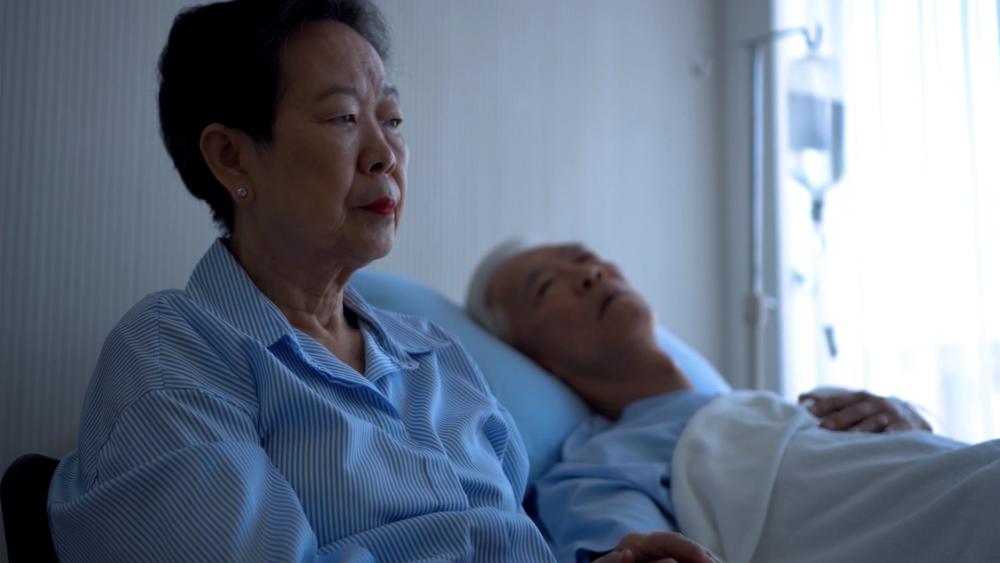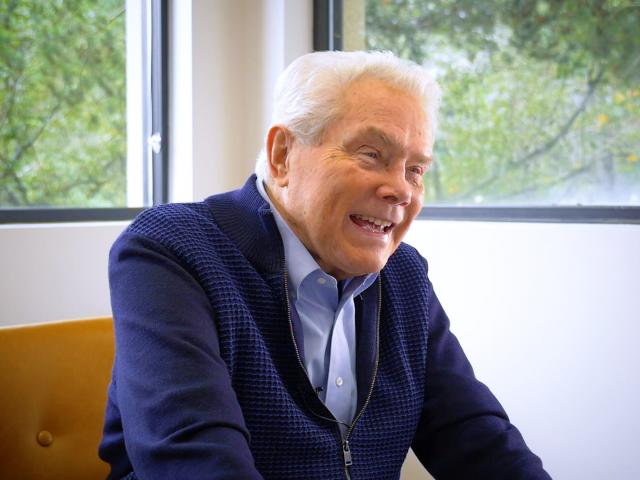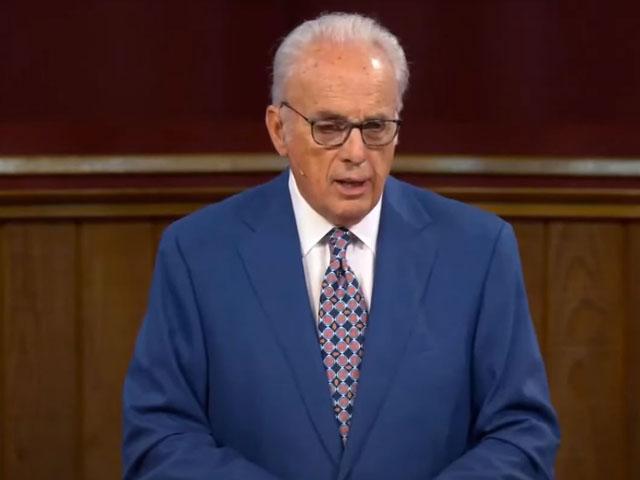While millions of Americans face the death of a loved one, many are unaware of a service that can greatly help them, as well as assisting the dying person, by helping to manage the challenges unique to the end of life. It's called hospice care, sometimes referred to as comfort care. Far too many people are unaware of the benefits of hospice care, or have misconceptions about the service.
Hospice care seeks to provide the highest quality of life as possible for a patient who has less than six months to live, when medical treatment is no longer an option, or is no longer desired.
Andrea's Experience
"Hospice is wonderful," said Andrea Garrett, who was assisted by the same hospice team twice within a six-month period. First, when her elderly mother-in-law passed in March of 2021 after a long illness, then again in June with her husband Bill which caught them both off guard.
"We weren't expecting it at all, but the same hospice team was there for us, and they walked us through it," she told CBN News. "They give you all the tools, as the loved one, to take care of the person you're caring for."
Hospice teams go to wherever the patient is. In Garrett's case, both her mother-in-law and her husband Bill were at her home.
"The doctor said he had stage four cancer. It was terminal, Bill understood that. And he said that any further treatment would only make him miserable and it wouldn't even necessarily extend his life. So with that understanding, we together made the decision to just go home," Garrett said. "He didn't want to endure painful, awful, lingering, treatment. He wanted to go home, and he wanted me to take care of him, and so that's what we opted to do."
It was the right decision.
"He actually said to me two days before he died, 'I never would have thought that dying would be so peaceful and pleasant,'" she said.
Not everyone who is eligible for hospice care accepts the service, possibly because they don't fully understand its benefits.
"There's a lot of misinformation out there, and there's a lot of things that people think hospice is about, that it really isn't about," Garrett said.
Hospice Myths
For example, accepting hospice care doesn't demonstrate a lack of faith.
"I think that we as a culture have this collective state of denial over death," Garrett said. "We don't want to believe that it's coming, and we don't want to accept it. Because it seems like when you choose hospice that you're just giving up on the person. And we always want to, as Christians, we want to have hope. And we want to hold out for that miracle," she said, adding, "If we're thinking clearly, we would know that if God's going to do a miracle he can do it in hospice, just as well as he can do a miracle if you're doing active invasive treatment."
Some mistakenly believe hospice hastens death, when research shows people actually live about a month longer in hospice, compared to people with similar health issues who didn't choose it.
Another misconception is that people in hospice are heavily medicated with morphine.
"We start all of our patients on a very, very low dose of morphine," Jessica Pope, RN, Administrator, Trinity Hospice told CBN News, "It's usually a liquid morphine."
Hospice workers teach family members to administer the drug as needed. Pope says sometimes people are surprised to learn that a little bit of morphine often invigorates the patient, by loosening the muscles that tend to tighten around the lungs of the elderly and critically ill.
"Imagine trying to breathe and someone is squeezing your ribs. It's painful, it's difficult, and if you're weak, already it's really hard to get that deep breath in. Morphine relaxes smooth muscle, so it helps those muscles relax so your loved one can take a big deep breath," Pope explained. "It also extends the life of oxygen, so oftentimes you think morphine's going to make your loved one feel sleepy, drowsy, and sedated. A low dose of morphine can actually give them energy."
Hospice workers frequently provide another drug, Lorazepam, to control anxiety and spasms.
"There's something at the end of life called 'Terminal Agitation,' and that can happen," Pope said, "But Lorazepam can relieve that, so the patient can rest. Their legs aren't all over the place."
Many people are unaware of the various resources offered through hospice, that are 100-percent paid for by Medicare. The hospice teams understand everything that's available, and can help patients and their families gain access to these goods and services.
"We cover all of the medications related to the hospice diagnosis and any symptoms that need managed. All of that is paid for. We give them a little pharmacy card and they go and we pay for that. And we cover equipment, so if your loved one needs oxygen we don't have to jump through hoops to get oxygen. We put that in the home. We can do hospital beds, low-air-loss mattresses if they need it, wheelchairs, any medical equipment, and it's all covered. There's no co-pay," Pope said.
Spiritual Guidance
Chaplains are an important part of the hospice team. They assist people of all faiths and those with no faith at all, according to Al Reynosa, a chaplain with Trinity Hospice, with things like repairing relationships and finding closure at the end of life.
"They ask questions about their family," he told CBN News. "They still have concerns about, 'What's going to happen to my family when I leave?' And so we try to set up that communication in case there's not that communication with family members, so they can have that closer connection at that time, because many times hospice patients, not all, will lose connection with family members because of life situations. So we try to bring those groups together, and work with them, to build some unity."
Chaplains counsel families and to among other things, speak to the dying patient even when it seems like they can't hear, because that sense is the last one to fail.
Most importantly, chaplains discuss issues of eternity with anyone who desires.
"What happens when people come to the end of their life, even if they are believers, many times people will still have, at that moment, doubts. They'll ask questions about eternity. They'll ask questions about their own salvation," Reynosa said."We're able to speak to them and reassure them that God is definitely with them at this moment. God would not leave them or forsake them. So that brings a lot of comfort to them, but also to their families."
Many people actually accept Jesus as their savior just before dying, according to Reynosa.
"We often have people who experience moments of conversion on their deathbed. Our ministers are really great. Our chaplains are really great at speaking the truth to folks, and of course they hear the things that's we're saying, and many have come to put their faith in Christ because of that."
Hospice workers observe most of the dying process is spiritual.
"In those last days it's not uncommon for people to see children they've lost, parents that have gone ahead, close friends, close family members, and that alone for me has totally affirmed my faith. I know that my loved ones are waiting for me," Pope said, adding that people often see God and Jesus, as well. "We had a family that said the patient was speaking to Jesus as if he was right there."
So while caring for a terminally ill loved one can be overwhelming, especially at home, hospice can ease that burden.
"I think a lot of times people are afraid that they won't be able to do it, they won't know what to do, they've never been with a person who is dying, they've never witnessed a person passing away," Garrett said. "That's very daunting. And it's very difficult. So you need somebody to help you, to encourage you that you can do it."
Hospice even offers grief counseling for more than a year after the death.
"It goes on a long time. And you reach different stages of that, of coping with what has happened," Garrett said, "So it was very helpful just to talk for an hour or so every month, or every few weeks, or however you want it, and that helps a lot."
While no one likes the idea of needing hospice care, those who use it often say it was so helpful, they wish they'd started it sooner.
Click HERE to watch the entire interview with Hospice Administrator Jessica Pope.
Did you know?
God is everywhere—even in the news. That’s why we view every news story through the lens of faith. We are committed to delivering quality independent Christian journalism you can trust. But it takes a lot of hard work, time, and money to do what we do. Help us continue to be a voice for truth in the media by supporting CBN News for as little as $1.










 Subscribe
Subscribe Follow
Follow CBN.com
CBN.com

 Support CBN News
Support CBN News







